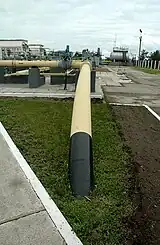vads
Latvian

Gāzes vads (1)

Elektrības vads (3)
.png.webp)
Vads (4)
Etymology
From the same stem as the verbs vadīt, vest (“to drive, to lead”) (q.v.). The original meaning was thus “leader, one who leads”; the technical meaning of “duct, pipe, vessel” arose in the 1920s, under the influence of Russian про́вод (próvod), German Leitung. Cognates include Lithuanian vãdas (“leader, commander”), Slavic -voda in compounds such as Russian historical воево́да (vojevóda, “war leader”), Czech vévoda (“duke”), Polish wojewoda (“ruler of a region, district”).[1]
Pronunciation
- IPA(key): [vats]
| (file) |
Noun
vads m (1st declension)
- pipe, tube, duct, chute (a cylindrical structure for transporting fluids)
- tvaika vads ― steam pipe
- ūdensvads ― aqueduct
- atkritumu vads ― garbage chute
- centrālapkures vads ― central heating pipe
- degvielas, eļļas, gāzes vads ― fuel, oil, gas pipeline
- (anatomy) tube- or pipe-like organ in the body
- asinsvads ― blood vessel
- barības vads ― oesophagus (lit. feeding tube)
- cable, wire used for electrical power transmission
- augstsprieguma vads ― high tension cable
- izolēts vads ― insulated wire
- elektrības, telefona vads ― electrical, telephone wire
- izvilkt vadu cauri istabai ― to pull a wire through a room
- dragnet, seine
- zvejot ar vadu ― to fish with a dragnet
- vilkt vadu ― to pull a dragnet
- (military) platoon (the lowest military tactical sub-unit)
- kājnieku vads ― infantry platoon
- vada komandieris ― platoon commander
Declension
Declension of vads (1st declension)
Derived terms
References
- Karulis, Konstantīns (1992) “vads”, in Latviešu Etimoloģijas Vārdnīca (in Latvian), Rīga: AVOTS, →ISBN
This article is issued from Wiktionary. The text is licensed under Creative Commons - Attribution - Sharealike. Additional terms may apply for the media files.